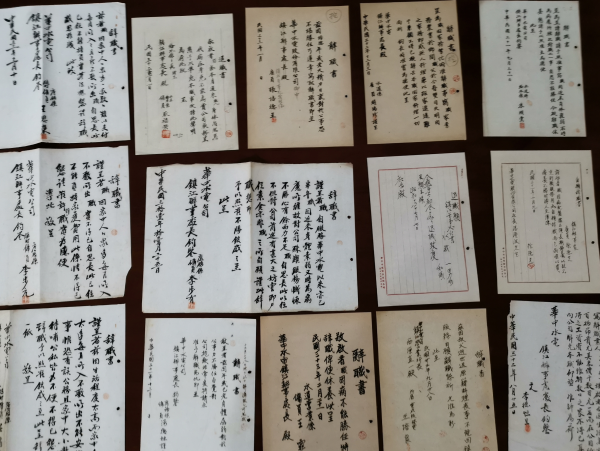Back in 2018, as the State Grid Zhenjiang Power Supply Company in Jiangsu Province prepared to establish the State Grid Jiangsu Power (Zhenjiang) Historical Museum, a remarkable find emerged during their archival research: a set of 20 resignation letters.
These letters unraveled a tale of brave resistance by electricity workers led by the Communist Party of China (CPC) over 80 years ago, serving as a constant reminder to cherish the hard-won fruits of revolution and never forget national humiliation left by the Japanese aggressors.

Part of the resignation letters [Photo/sasac.gov.cn]
The story can be traced back to December 8, 1937, when the invading Japanese troops breached Zhenjiang, the then provincial capital of Jiangsu during the period of the Nationalist government under Kuomintang. The Japanese troops unleashed atrocities in the city including massacres, turning Zhenjiang into a living hell.
Dah Chao Electric Light Co., the predecessor of the State Grid Zhenjiang Power Supply Company, the sole power plant in Zhenjiang at the time, was targeted by the invading Japanese troops.
Witnessing the suffering of his compatriots, Guo Yongqing, a sub-manager of the company, sacrificed his own residence and parts of the company's offices and employee dormitories to shelter over 600 homeless refugees, providing them with winter clothing and food at his own expense.
From 1938 to 1940, the invading Japanese forces tightened their control over the Dah Chao Electric Light Co., monopolizing coal supplies and coercing the company into high-pressure military-style governance.
During the early period of occupation of Zhenjiang by the Japanese troops, the underground CPC working committee in Zhenjiang secretly sent a Party member to the Dah Chao Electric Light Co. to organize workers' movements. Unfortunately, the member was arrested by the Japanese troops.
In early 1939, a progressive youth named Guo Weigeng, who was the son of Guo Yongqing, became a key figure who helped to organize the workers’ movements in the company.
Influenced by his father, Guo Weigeng, still a high-school student at the time, loved his country from a young age. Witnessing Japanese atrocities in the occupied territory during the war, and under the guidance of his teacher Xie Feng, a leader of the underground CPC working committee in Zhenjiang, he secretly determined to join the CPC to resist the Japanese aggressors, quickly becoming an underground member of the Communist Youth League.
Guo Weigeng frequently visited the Dah Chao Electric Light Co. under the pretext of visiting his father. He was amiable and had established warm relations with the workers in the factory from a young age.
Leveraging his rapport with the workers, the underground CPC working committee in Zhenjiang arranged for a Party member to enter the company under the guise of Guo Weigeng's friend, initiating a workers' movement against the Japanese aggressors and eventually recruiting five employees into the underground Party organization.
In 1941, the Japanese aggressors established multiple factories in Zhenjiang for military purpose, intensifying production to sustain their aggression. To meet the factories' demand for the power supply, the Japanese aggressors ordered the Dah Chao Electric Light Co. to operate at full capacity.
Given the situation, the underground CPC working committee in Zhenjiang and the Party members in the factory organized workers to stage an act of strategic resignation, disrupting power supplies.
To avoid arousing suspicion from the Japanese troops and ensure the safety of the workers, the underground CPC working committee in Zhenjiang devised a strategy of resignations on a gradual process, starting with those from the departments of administration and water supply from winter 1941 to autumn 1942. Over 10 employees submitted resignation letters without significantly impacting production. Their resignations ignited the spirit of resistance against the Japanese aggressors among the workers, prompting more to follow suit.
By the end of 1943, the world anti-fascist war reached a critical stage. The underground CPC working committee in Zhenjiang decisively mobilized more workers to resign and organized the sabotage of the factory's generators, dealing a severe blow to the enemy's military production.
The remaining 20 resignation letters serve as a precious epitome of the vigorous resignation movement during the Chinese People’s War of Resistance Against Japanese Aggression, bearing witness to the historical struggle of electricity workers led by the CPC against Japanese aggressors.
(Executive editor: Yuan Ting)